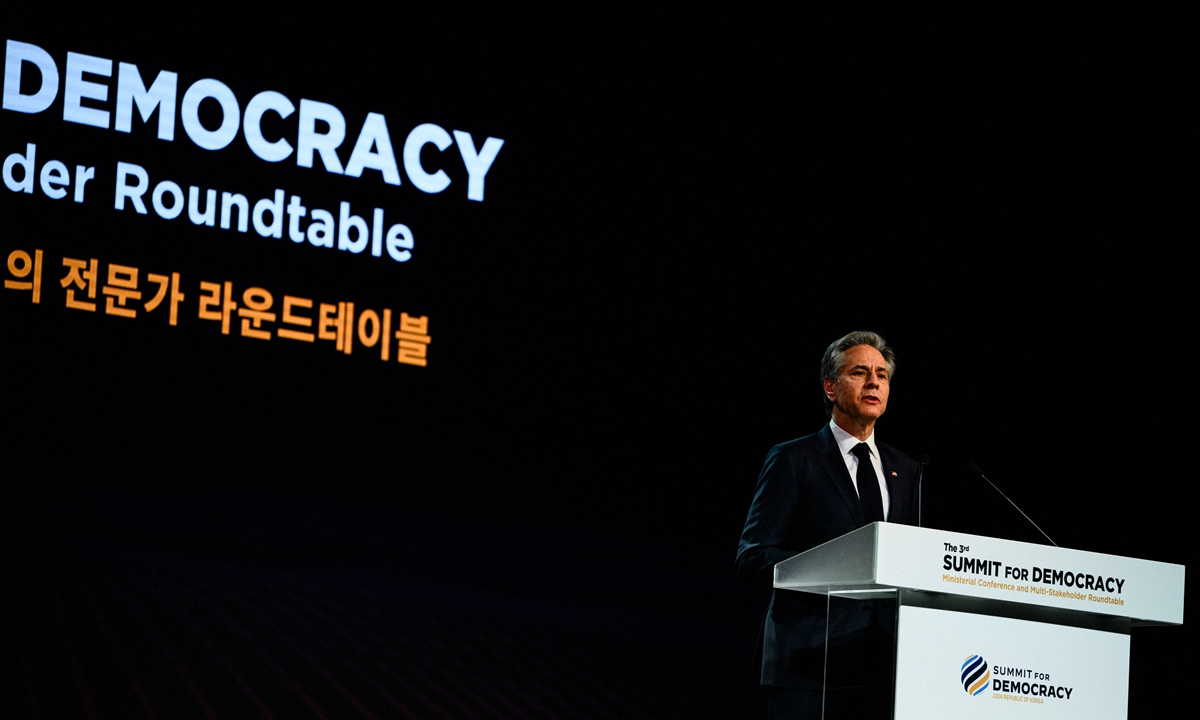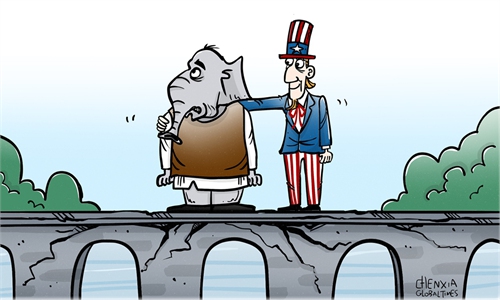
US Secretary of State Antony Blinken delivers a speech during the Multi-Stakeholder Roundtable session at the Third Summit for Democracy in Seoul on March 18, 2024.Photo: AFP
The third Summit for Democracy takes place from March 18 to 20 in Seoul, South Korea. Two years ago, the first summit organized by the Biden administration caused great controversy. Last year, the second summit ended amid widespread doubts and criticism, and then the low-key convening of the summit this year has gained less attention in the international community. I recently visited Seoul, the host of this year's Summit for Democracy. I found that there was little coverage of the event in major Korean media, and no one mentioned it in our exchanges with Korean officials and think tanks.It is important to note that, as a multilateral summit, it was already doomed to fail when it generated far more controversy than attention to the outcome.
In this so-called Summit for Democracy led by the US, the selection of participating countries has been full of controversy from the very beginning, arousing international opposition and skepticism. As early as the first summit, some Western countries pointed out a major problem: the US even invited some "non-democratic countries" that are favorable to US geopolitical interests to participate in the summit.
China had no interest in this farce created by the US, but the fact that the US had invited regional leaders from the Taiwan province to the first two summits with malicious intentions, which constituted a blatant violation of the one-China principle, forced China to respond.
The Summit for Democracy organized by the US is in fact a blatant attempt to create division in the world and trample on the true spirit of democracy.
The US lauds itself as the "beacon of democracy," but what is the reality of democracy in the US? According to a report released by Germany-based Dalia Research and the Alliance of Democracies, less than 50 percent of Americans surveyed think their country is democratic and 43 percent of respondents globally think democracy in their countries is threatened by the US. How can the US be in a position to criticize the democracy of other countries if American democracy is failing to win the trust of its own people?
The US has incited the Neo-Monroe Doctrine in Latin America, fomented color revolutions in Eurasia, and instigated the Arab Spring in West Asia and North Africa. This has brought continuous social chaos and human rights disasters to many countries.
The US, unable to resolve its own problems, attempts to shift the focus externally. Under the name of so-called challenges to the international order and threats to the democracy worldwide, the US seeks to monopolize the global agenda through the Summit for Democracy, monopolizing the power to define democracy, merely as another tool to maintain its hegemony.
What did South Korea get? A year ago, when South Korea took over the "responsibility" of hosting the third summit, it seemed to align well with the ambitious "value-based diplomacy" concept of the Yoon Suk-yeol government. However, things have changed. Faced with the upcoming parliamentary elections in April and the ongoing crisis in the medical sector, the Yoon government seems to have lost its initial enthusiasm for this summit.
Lee Sook-jong, a senior fellow at the East Asia Institute, an independent think tank based in the South Korean capital, stated in an interview with Swiss media that as a co-coordinator of this summit, she found that South Korea did not provide the necessary resources, infrastructure and technical support. She pointed out that many countries have become lukewarm toward this summit, admitting that she did not know if the summit could continue after the third summit.
Looking at its attendance, it could hardly be called a summit. The initiator, US President Joe Biden, does not personally attend this summit and only sent Secretary of State Antony Blinken to Seoul. Very few top leaders will attend the event in person, and many leaders only sent short videos. The public opinion, both in South Korean and from the globe, has lost interest in the attendance list, let alone the content and achievements of the summit. It is doubtful if anyone in the world knows what results this summit will achieve.
With the upcoming US presidential election, "American-style democracy" seems to have reached a new crossroads. No one knows if the Summit for Democracy can continue, and it may be time for this farce to come to an end.
The author is specially appointed research fellow at the Department for Asia-Pacific Studies, China Institute of International Studies. opinion@globaltimes.com.cn

